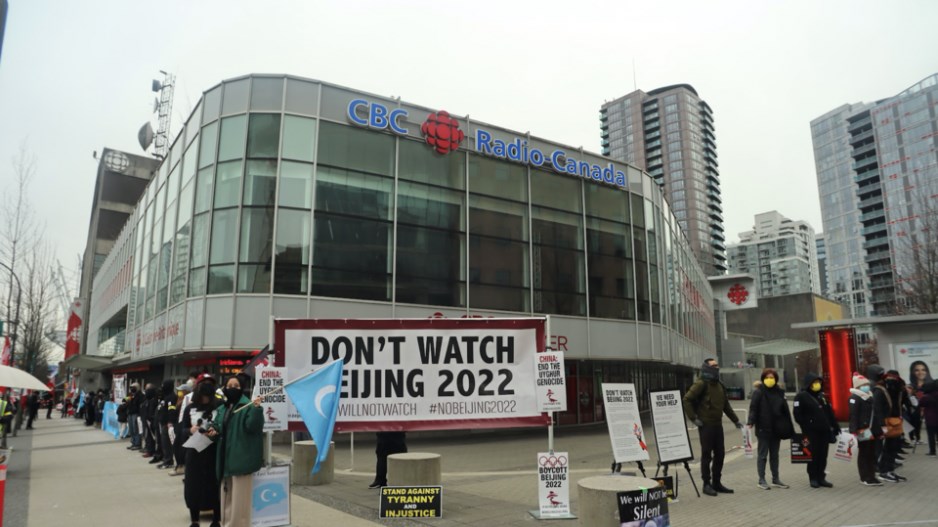Fewer than one million Canadians tuned into CBC’s encore broadcast of the opening ceremonies of the Beijing Winter Olympic Games, thus marking a significant decline in television viewership from past events.
The decline coincides with numerous polls leading up to the Feb. 4 ceremony that indicated a majority of Canadians were prepared to tune out for political reasons, as highlighted by a small protest at CBC Vancouver studios last Saturday.
CBC spokesperson Leon Mar told Glacier Media the live broadcast of the opening ceremonies received an average audience of 788,000 viewers whereas the encore broadcast in the evening garnered 943,000 viewers across all networks (CBC, TSN and Sportsnet). Viewership peaked at 1.2 million when Team Canada entered the stadium, noted Mar, citing data from broadcast measurement organization Numeris.
Mar, via email, said the encore broadcast was still the most-viewed TV program in Canada that day. He added that digital streaming increased 80% compared to Tokyo’s summer games opening ceremony in 2021 but provided no figures.
The 2018 Winter Games in Pyeongchang, South Korea saw 1.25 million Canadians tune in, according to a report from the Globe and Mail. The live event numbers for Beijing thus represents a 37% decline over the 2018 games. And in 2014, Canadian Press reported 2.65 million average viewers for Sochi 2014, including seven-day recording (PVR) playbacks.
By comparison, in the United States, NBC reported a 43% decline in opening ceremony viewers for Beijing, as compared to 2018. Yahoo Sports reported the Beijing ratings of 16 million viewers was a record low.
Asked what CBC attributes the decline to and whether it specifically acknowledges a possible negative impact from people tuning out for political reasons, Mar explained, “The linear television landscape has changed drastically when comparing the total available audience in Canada in 2022 to what it was in 2018.”
Mar said video streaming services are up while overall cable viewing is down. He said the 2021-22 broadcast year is showing a year-over-year decline of 7%.
Households with paid cable declined from 8.7 million in 2019 to 7.7 million in 2022 — an 11% decline, according to emarketer.com.
Mar did not address the protests but said Beijing’s opening ceremony viewership was on par with Tokyo’s opening ceremony on July 26, 2021 (just over one million viewers).
While an exact apples-to-apples comparison may prove difficult, Research Co. pollster Mario Canseco says it’s evident to him a good chunk of Canadians have detached themselves from the games in China for political reasons.
“I think it’s basically the situation in China. We asked about this in December and we asked again in January and we have almost half who say they are making a conscious decision not to watch the games,” said Canseco.
“It’s misguided to think this has nothing to do with the host country,” said Canseco.
On Feb. 1, Canseco issued his polling company’s most recent findings that 47% of Canadians intended to “make a conscious effort to refrain from watching the sporting event.”
Furthermore, 59% of Canadians thought Canada should have fully boycotted the Olympics over China’s human rights record. Instead, the Canadian government chose a symbolic gesture to not send diplomats to the ceremonies as part of a global diplomatic boycott.
In December, an Angus Reid poll found 78% of Canadians supported some form of boycott, from a full athlete boycott (40%) to a fan boycott or a diplomatic boycott.
Canseco questioned the impact of streaming on TV viewership as well.
“It’s understandable they are looking at streaming taking a toll on viewership …but it’s not as though the situation changed drastically” since 2018.
Canseco said while there are still stories to be told at the games, he foresees issues with bringing in more viewers at this stage.
“Part of the coverage is providing a taste of the host experience. You can’t do that in a place where you’re constantly surrounded by police officers and people with bracelets telling you where to stand.
“It’s not like you can pretend, like the IOC (International Olympic Committee), that the games aren’t political, because they are,” said Canseco.
He speculated that if the low viewership trend continues through the next two weeks of the games it could spell consequences for advertisers seeking consumers’ attention at future Olympics.
“It’s a big problem especially for local brands. I think it won’t be deeply affecting the brands around the [International] Olympic Committee, the Coca Colas of the world. But if you’re aligned with the Canadian Olympic Committee, that is what makes it a little more complicated.
“For the Canadian Tires of the world, this is a problem,” said Canseco.
Asking Canadians to tune out is exactly the goal of pro-democracy groups in Vancouver, who formed a human chain around CBC Vancouver’s studios last Saturday.
“With China’s many violations of human rights and freedom — persecution of Christians and Falun Gung practitioners; with its genocide of the Tibetan and Uyghur minorities; with its brutal crackdown and suppression of the city of Hong Kong, and jailing of human rights activists — China can and should no longer be considered a responsible member of the community of nations,” said Mabel Tung, chair of Vancouver Society In Support of Democratic Movement, via email.
Co-organizer Jody Chan added “We cannot normalize human rights violations. Each person has their own personal choice to make, to not watch these games and to not let sponsors make money from this abhorrent situation.”




